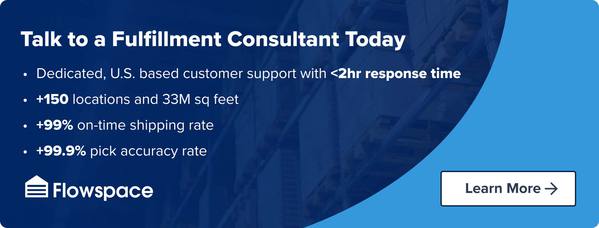
When the pandemic hit in 2020, subscription-based, tree-free paper company Reel Paper saw a huge increase in orders. Toilet paper suddenly was a hot commodity, and Reel needed to optimize its subscription order fulfillment to meet customer demand.
While subscription boxes started to gain popularity in the 2010s, the subscription box service industry is here to stay. In 2021, the industry was worth $72.91 billion. That valuation is expected to reach $904.2 billion by 2026.
Fulfilling subscription orders adds additional complexity for ecommerce. This article will look at the subscription fulfillment process, the challenges, and when subscription box service brands should consider a subscription box fulfillment partner.
What Is Subscription Fulfillment?
Subscription fulfillment is when a brand ships customers a product or a selection of products on a regular basis, whether that’s weekly, monthly, or annually. Products can be the same—in the case of Reel Paper’s sustainable toilet paper—or a collection of related but different items—in the case of Birchbox.
Key Components of Successful Subscription Box Fulfillment
Because customers expect their products on a regular cadence, ensuring a successful and efficient fulfillment process for subscription boxes is key to keeping customers happy. We’ll look at all of the steps in this complex fulfillment process for subscription box companies.
Efficient Order Management
Because of the added complexity of subscription-based orders, brands need an efficient order management and order fulfillment system that can rise to the challenge. Successful order management requires a combination of real-time visibility into orders, product inventory management, network optimization, and data analysis and insights.
Inventory Management and Storage
Subscription box fulfillment service involves managing inventory for a wide range of products, often from multiple suppliers. Effective inventory management is essential to ensuring that boxes are consistently filled with high-quality products. A customer expecting a delivery of toilet paper would be none too happy to find out the product is out of stock.
Accurate and Timely Picking and Packing
The ability to pick, pack, and ship orders quickly and accurately is crucial to a successful subscription box fulfillment service. This requires a reliable and efficient fulfillment process that ensures customers receive the correct products on time and in good condition. A customer would not be happy receiving paper towels when they’re expecting an order of toilet paper.
Fast and Reliable Shipping
Because subscription boxes require shipping products in regular intervals, brands need to have reliable shipping to ensure that the products get to customers when they expect and need them. After all, what good is a toilet paper subscription if the customer runs out while they’re waiting on an order to arrive?
Personalization and Customization
Many successful subscription box services offer personalization or customization options, such as allowing customers to choose products or providing recommendations based on their preferences. This requires a scalable and flexible fulfillment process that can accommodate different product combinations and preferences.
Challenges in Subscription Box Fulfillment
As we already mentioned, fulfilling subscription-based orders can be more complicated than regular one-off ecommerce orders. The following are some of the challenges brands might face when handling subscription box fulfillment.
Fluctuating Demand and Inventory
Oftentimes, subscription boxes are specially curated boxes, and the products change on a regular basis. This fluctuating inventory requires special attention to ensure all products are in stock and ready to be packed into boxes and shipped out on time. Even for subscriptions that are singular products, brands need to make sure they have enough inventory to meet the recurring subscription orders while also accounting for any increased demand.
Managing Customer Expectations
Ensuring the quality of products included in subscription boxes is essential to maintaining customer trust and loyalty. However, quality control can be challenging when dealing with a large number of suppliers and products.
Scalability and Flexibility
While the subscription model often means fewer seasonal changes in demand, subscription boxes can still experience some fluctuations. For example, many people buy a few months of a subscription box for gifts around the holidays. Media coverage could mean a spike in demand, while an economic downturn could mean customers canceling subscriptions to save money.
Returns and Exchanges
Handling returns and exchanges can be a logistical challenge for subscription box services, especially for those boxes that change every month. Brands need to have a clear and efficient process in place for managing returns and exchanges while minimizing the impact on customer experience.
What to Look For in a Subscription Fulfillment Provider
While fulfilling subscription boxes in house might seem like the smart option, when a brand’s revenue grows, that in-house fulfillment can quickly become the most time-consuming part of the business. Many brands choose to outsource subscription box fulfillment, considering factors such as 3PL vs freight broker services, so they can focus on other aspects of the business.
There are a few things brands need to consider when choosing a subscription fulfillment partner or fulfillment company.
Industry Experience and Expertise
Brands should look for a provider or fulfillment company with a proven track record of handling subscription box fulfillment. They should have experience managing inventory, picking and packing orders, and shipping products efficiently. Even better if brands can find a partner with expertise in a niche industry, such as beauty product subscription boxes.
Technology and Systems Integration
One of the benefits of outsourcing fulfillment is that fulfillment partners usually have access to more advanced technology than a brand would if they handled fulfillment in house. Brands should look for a provider that uses advanced technology to manage inventory, track shipments, and provide real-time data and insights. This can help brands optimize operations and improve the customer experience. Brands also want to make sure any partner’s technology integrates with any systems they currently use.
Transparent Pricing and Services
While outsourcing fulfillment can be convenient for brands, it comes at a price. Brands should look for a partner that offers transparent pricing and works with brands to manage costs while maintaining quality and customer satisfaction. In addition, brands should make sure the services the partner will (and will not) provide are clear to avoid unwanted surprises.
Choose Flowspace for Your Subscription Fulfillment Needs
When Reel Paper’s demand skyrocketed in 2020, their 3PL partner was unable to keep up with order volume, and accountability became an issue as orders were shipped late or incorrectly. Reel turned to Flowspace for network optimization, omnichannel fulfillment, and the real-time visibility the platform provides.
By using Flowspace’s subscription fulfillment services, Reel’s products are stored and fulfilled from Flowspace’s warehouses, allowing them to save on storage costs and avoid the hassle of managing their own inventory. Flowspace’s advanced inventory management system can track product levels and notify Reel when it’s time to restock its most popular products to avoid the dread stock-out. This is especially critical because subscription customers expect their products on time, every time.
Overall, Flowspace’s subscription fulfillment services helps Reel Paper streamline their operations and focus on growing their business, while leaving the warehousing and fulfillment tasks to a trusted partner.
If you’re looking for a fulfillment partner to optimize your subscription fulfillment, get in touch with Flowspace today.







